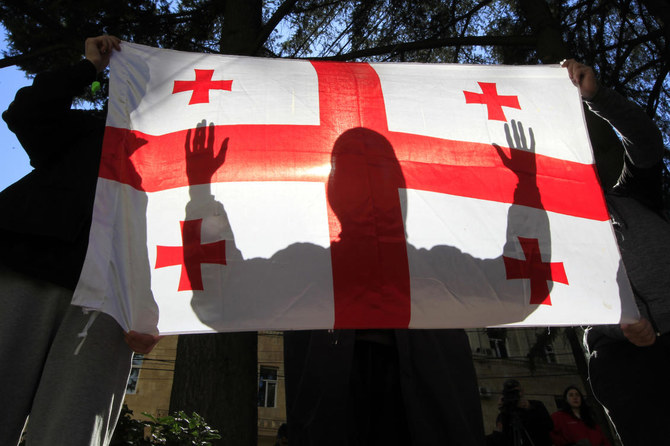Georgian Prime Minister Irakli Garibashvili accused Ukraine’s President Volodymyr Zelensky of meddling in his country’s political situation by commenting on protests there last week, prompting an angry response from Kyiv.
During the protests against a “foreign agents” law that critics said signaled an authoritarian shift in Georgia, Zelensky thanked protesters for waving Ukrainian flags, saying it showed respect, and he wished Georgians “democratic success.”
Last Friday, Georgia’s parliament dropped the bill, which had threatened to harm Tbilisi’s bid for closer ties with Europe. Critics had said it was inspired by a 2012 Russian law that has been used widely to crack down on dissent in Russia.
“When a person who is at war... responds to the destructive action of several thousand people here in Georgia, this is direct evidence that this person is involved, motivated to make something happen here too, to change,” Garibashvili said in an interview with the Georgian IMEDI television broadcast on Sunday, referring to Zelensky.
“I want to wish everyone a timely end to this war, and peace,” Garibashvili added.
However, Ukraine’s foreign ministry spokesperson Oleh Nikolenko accused Garibashvili of repeating “Russian propaganda” by suggesting that Kyiv sought to draw Georgia into its conflict with Moscow.
“We categorically reject such claims, which have nothing to do with reality. The Georgian authorities are looking for an enemy in the wrong place,” Nikolenko said on Facebook on Monday.
“Ukraine has been and will remain a friend of the Georgian people, whom we do not wish to stop (in their task of) building a European future.”
Despite Garibashvili’s comments, Georgian public opinion is strongly pro-Ukrainian and anti-Russian. Georgia fought its own brief war with Russia in 2008 over the status of two Moscow-backed breakaway regions, Azkhazia and South Ossetia.
Georgia and Ukraine both aspire to join the European Union one day.
Georgian PM tells Ukraine’s Volodymyr Zelensky not to meddle in his country
Short Url
https://arab.news/4rpay
Georgian PM tells Ukraine’s Volodymyr Zelensky not to meddle in his country

- Volodymyr Zelensky thanks protesters for waving Ukrainian flags, saying it showed respect, and he wished Georgians ‘democratic success’
- ‘When a person who is at war... responds to the destructive action of several thousand people here in Georgia, this is direct evidence that this person is involved’













